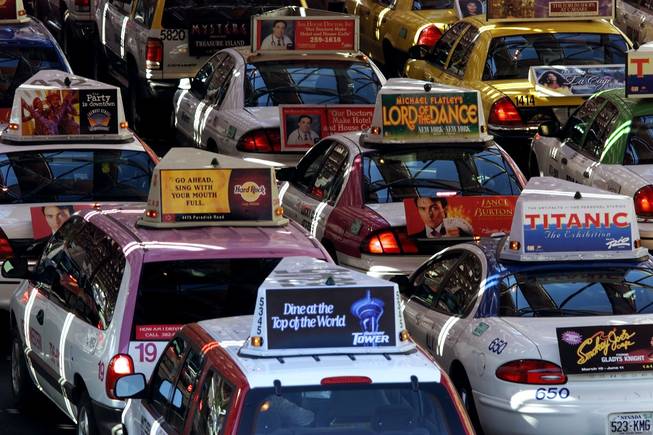
Las Vegas Sun File
Taxis wait at “the pit” for fares at McCarran International Airport. At any time, there are about 2,000 cabs on Las Vegas streets.
Wednesday, Aug. 2, 2017 | 2 a.m.
Taxis bearing marijuana advertisements could be banned from carrying passengers to and from McCarran International Airport, if ambiguous wording in a proposed ordinance isn’t clarified — or if certain county commissioners get their way.
The Clark County Commission, which oversees McCarran as well as the region’s smaller, noncommercial airports, held a public hearing Tuesday for a proposed ordinance that would make the possession and advertisement of marijuana illegal on all airport-owned properties. According to Director of Aviation Rosemary Vassiliadis, the intent of the ordinance is to keep the airport in compliance with federal regulations by controlling “the airport environment,” but “not the transient vehicles that come through the airport.”
But county lawyers say the wording of the ordinance does not offer clarifications or exceptions to the ban, meaning it could be applied to the taxis and mobile billboards that drive onto airport property, or even to a local dispensary owner whose car is wrapped to promote the business.
Vassiliadis told the commissioners that was contrary to intent and that her staff could work with the legal department to craft clearer wording. But several commissioners liked the sound of the harsher interpretation.
The board’s most outspoken official against recreational marijuana, Commissioner Marilyn Kirkpatrick, added: “I don’t want it anywhere.”
“I’d prefer to see us go to the limit,” said Commissioner Larry Brown. “Ban everything related to recreational and medical marijuana. Once (the industries) have a track record, we can adjust.”
Vassiliadis said it would be difficult, if not impossible, to enforce a ban that wide-ranging.
“(The ordinance) has to be realistic,” she said, adding that advertisements on taxis are already regulated by other authorities.
Vassiliadis said staff modeled the proposed ordinance on existing policies at Denver International Airport and Colorado Springs Airport, which have dealt with these very issues for the past five years.
The commissioners ultimately decided to hold the item for 30 days to clarify the ambiguous wording and to gain additional input from the Green Ribbon Advisory Panel, the Nevada Taxicab Authority and other relevant parties. No representatives from the taxi or marijuana industries were present on Tuesday, presumably because the ordinance had been explained to them earlier with the intent presented by Vassiliadis rather than the interpretation by the county attorneys.
Commissioner Jim Gibson stressed the need to be thorough with the ordinance in order to protect McCarran as a valuable resource to Southern Nevada.
“We need to be practical,” he said. “It has nothing to do with the level of support for the (marijuana) industry.”
Marijuana is considered a Schedule I (read: worst of the worst) drug by the Federal Aviation Administration and other federal entities. That creates inherent conflict with airports located in states where marijuana has been partially or fully legalized. To qualify for federal grants, airports must comply with being a “drug-free workplace.”
Rather than test the boundaries and possibly lose necessary funding, most airports around the country have opted to enact restrictions on marijuana to keep their reputations intact.
“They don’t want to create an atmosphere that suggests they’re pushing people toward it,” said David Bannard, a partner at Foley & Lardner in Boston who sits on a board of Airports Council International. “Airports may (already) limit hard alcohol; they may limit political advertisements. This is just an extension of that.”
Bannard adds that public perception of marijuana is still a driving factor.
“It continues to be an issue that people are uncomfortable about,” he said. “People (in the aviation industry) talk about damage that’s not physical but reputational. Airports really work hard to maintain their good image. Airports in this country are so safe and so well run. Even when (marijuana) is legal to possess, given a choice, it makes more sense to preserve that perception.”
Bannard predicts that marijuana will eventually be regulated in similar ways as tobacco: Individual states have varying laws on taxation and age limits, but the FAA doesn’t regulate the movement of it across state lines via airspace. As more and more states move toward marijuana legalization in some form, a legal case could test the boundaries of what the FAA is allowed to regulate.
However, until some sort of critical mass is reached, expect more caution from airports. The prevailing attitude could be summed up by Vassiliadis' response when asked by Chairman Steve Sisolak if the FAA cared about taxi advertisements at the airport: “It has not been tested. We don’t want to be the test case.”
Editor's note: Brian Greenspun, the CEO, publisher and editor of the Las Vegas Sun, has an ownership interest in Essence Cannabis Dispensary.

Join the Discussion:
Check this out for a full explanation of our conversion to the LiveFyre commenting system and instructions on how to sign up for an account.
Full comments policy